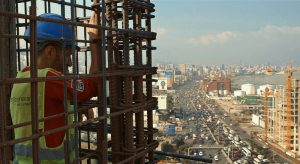(THIS ARTICLE IS MACHINE TRANSLATED by Google from Norwegian)
The 2017 edition of the Swiss film festival Visions du Réel in the city of Nyon was the last under the direction of Luciano Barisone. This year, the festival has once again shown that it has as one of its main tasks to give marginalized people, often helpless and left to themselves, an opportunity to be seen and respected. Individuals torn apart from theirs, with limited opportunities for communication and social well-being and ignored by the outside world, are offered an international platform where they can confirm their existence. This year it was Ziad Kalthoum's remarkable documentary Taste of Cement who won the award for best feature length documentary.
Intimate and magnificent. Taste of Cement is an audio-visual masterpiece that elegantly incorporates all these marginalized conditions. Talal Khoury's camera rests on silent, motionless, introverted, worn-out faces with no trace of hope. He seamlessly switches from meditative, detailed images to surprising panoramas, such as the opening scene where a small view from a quarry opens up to a magnificent view of the city of Beirut.
The soundtrack offers a sublime blend of sound and silence. Often completely detached from the visual, the sound often refers to a huge construction site where Beirut's tallest skyscraper is under construction.
On the one hand, this building process symbolizes resistance and the will to return to normality and prosperity. On the other hand, it represents, in a metaphorical sense, the ongoing destruction of the region. In one of the most impressive audiovisual scenes, the film combines the complex sounds and movements of the construction work taking place at a staggering height, with the recording of a missile tank raging through and over a completely annihilated city somewhere in Syria. The noise from the workers' heavy machinery, the cannon drones from the tanks and the deafening industrial noise are all parts of the same destructive process.
 Syrian workers. Occasionally we hear the quiet voice of a narrator delivering finely tuned allegorical and metaphorical comments. At the beginning of the film, he talks about his first encounter with the ocean and the expansion of his consciousness, even though it was only in the form of a painting that his father, also a construction worker, had brought from a nearby city. Towards the end he returns to this memory: This time he is shattered by the painted waves in the sea in the picture. The narrator's voice also delivers the deeper, underlying story within Taste of Cement: "When a war begins, construction workers must move to another country where the war has just ended – while they wait until the war has stopped sweeping across the homeland. Then they travel back to embark on reconstruction. ” This sheer characteristic of the tragic of an endless war is the very philosophical essence of director Kalthoum's work.
Syrian workers. Occasionally we hear the quiet voice of a narrator delivering finely tuned allegorical and metaphorical comments. At the beginning of the film, he talks about his first encounter with the ocean and the expansion of his consciousness, even though it was only in the form of a painting that his father, also a construction worker, had brought from a nearby city. Towards the end he returns to this memory: This time he is shattered by the painted waves in the sea in the picture. The narrator's voice also delivers the deeper, underlying story within Taste of Cement: "When a war begins, construction workers must move to another country where the war has just ended – while they wait until the war has stopped sweeping across the homeland. Then they travel back to embark on reconstruction. ” This sheer characteristic of the tragic of an endless war is the very philosophical essence of director Kalthoum's work.
The sheer characteristic of the tragic of an endless war is the very philosophical essence of director Kalthoum's work.
Most of the construction workers in the film are Syrian refugees. We are made aware of this fact through the excellent use of the "show, don't tell" technique, which also emphasizes the qualities of brilliant documentaries. We see the tired bodies of Syrian construction workers resting on the construction site in the evening, surrounded by all kinds of equipment and dirt. A curfew applies to Syrian workers after 1900. At the same time, messages with racist content are spread in Beirut and elsewhere. The political messages are seen and heard from television screens and radios, or we can see them as pictures on the small screens of their mobile phones, which are often the only light sources in the room. We see pictures of the destruction of two million Syrian homes; Only in Aleppo and the suburbs of Damascus are there as many as 400 and 000 respectively. Kalthoum projects this news on the pupils to the seemingly numb viewer. In one of the film's most painful scenes, civilians try to save bodies that are buried alive under the rubble after a bomb attack – but here too the camera avoids voyeuristic images.
The power of memories. The film ends with a rotating camera shot. The camera is mounted on a car passing through Beirut. The image of the city swirls endlessly, losing weight and significance: a kind of power game that no one seems to dominate.
We hear that the narrator's father was also a construction worker, but when he returned home after struggling with the cement, he withered and died.
The faces of the workers on the upper floors, where the pictures also encompass the panorama of a seemingly thriving and promising city and the sea outside, seem hopeless where they are captured by Kalthoum's camera. These construction workers are victims of their memories, or more precisely, victims of their forgotten memories. They do not remember a life before the war.


